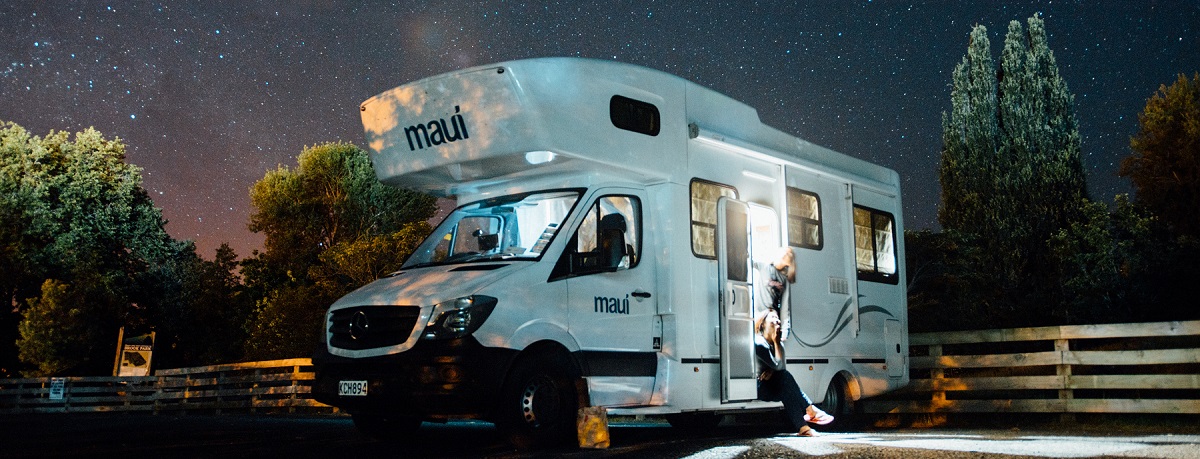The Key Concepts of RV Insurance Explained
If you are a true adventurer who loves spending time behind the wheel, make sure you've got your RV insurance whenever you're on the road. It can save you from unnecessary costs and lawsuits so that you can free your mind and continue exploring the world.

RV stands for "recreational vehicle," and it's widely used among the American people. It's more like a personal vehicle that's convenient for camping and outdoor lifestyle, and even though it's related to nature, barbecue and campfire, it still brings a risk of potential accidents. To protect yourself from excessive costs and lawsuits caused by different inconveniences, consider purchasing an RV coverage that’ll allow you to hit the road without worrying.
What is RV Insurance?
In a nutshell, RV insurance protects you and your recreational vehicle from costs of loss or lawsuits. Most people see RV and auto insurance as the same concepts, but the truth is that these coverages are completely different. That said, car insurance can’t protect your RV properly, but you need to purchase a separate policy that will kick in when necessary.
A specific RV policy represents a hybrid between car and homeowners insurance, which means that it covers your engine, wheels and other automotive parts, including your home belongings (laptops, TVs, cell phones, dishware, etc.), unlike an auto coverage that won’t compensate for the damage of your bathroom or kitchen.
What Does RV Insurance Cover?
There are two main types of RV coverage – a full time RV insurance and a part time insurance. If you’re purchasing the RV for the first time, it’s essential to understand how you will use it because that’s the factor that’ll determine the type of policy you’ll choose. Let’s see the difference:Full Time RV Insurance
When you’re a full-timer, that means that you’ll be using RV as your home. That said, such a policy will provide you with adequate liability insurance that will cover for losses associated with parking an RV or using it as your primary residence. That would be similar to homeowners insurance. A full-time policy usually covers medical expenses, as well.Part-Time Insurance
If you are an occasional RV driver and you don’t use it as your residence, a part-time or campsite insurance would be the right choice for you. It includes most of the benefits of full-time insurance, but it’s a bit cheaper since it’s less comprehensive than the other policy. In addition to these types, there are some other ones that you can include in your policy if you find them necessary:- Accessories coverage – This type of RV policy will cover for all the accessories that are the part of your vehicle, even if you added them after you’ve purchased it. That includes antennas, satellite dishes, awnings, and other stuff that’s attached to the RV.
- Emergency expenses – In case you get involved in an accident while you're more than 50 miles from home, the policy will cover for temporary living expenses such as a hotel or rental car.
- Fire and flood – If your RV gets damaged due to fire or flood, the policy will cover for repairment or replacement.
- High liability limits – You can choose the policies that will cover $100,000 per person, $300,000 per accident and $50,000 in property damage for the accidents that you’re liable.
- Low branch collision – This policy will pay for damages on your RV and other items that are attached to it, including awnings and A/C units.
- Personal items replacement – To get the replacement of your items, it's essential to keep an inventory of your furniture and other stuff found in your RV.
- Total loss replacement – With RV insurance, you have the opportunity to get even a new vehicle if the accident destroys your current one within its first five years. After that time, the coverage will pay for the original price toward the cost of a new RV.
- 24/7 roadside assistance – In case you get stuck on the road, such coverage can help you in terms of towing, locksmith, breakdown, battery failure, flat tire, fuel delivery and entrapment in snow, sand, water or mud.
- Uninsured motorist coverage – This is one of the coverage parts that's the same as in traditional car insurance. Namely, if you get involved in an accident with someone uninsured or underinsured, the policy will save you from high costs.
- Medical payment coverage – This coverage will compensate for the medical expenses for both yourself and your passengers in case of an RV accident, no matter who’s at fault.
- Storage coverage – This type of policy is especially convenient for part-time RV drivers who won't need to pay the full price of the coverage when your vehicle is in storage. For example, during winter, when you are not doing any driving.
- Comprehensive coverage – With this policy, you can be sure that all the stuff that gets damaged outside of the collision will be paid, including theft, vandalism, falling objects, fire, storms, floods and other natural disasters. Still, you should check that with your carrier since every coverage comes with certain limitations.
- Pet injury coverage – If you live in RV with a pet, it’s essential to add it to your policy even if you are not a full-timer.
Is RV Insurance Valid When Traveling Out Of the Country?
The insurance for RV that’s purchased in the USA is mostly not valid when crossing the border. It also depends on the insurance agency where you’ve purchased the policy, and you should check with them whether your plan is in effect out of the country. For example, most RV coverages from the USA are not valid in Mexico, and if you plan on going there with your camper, ask your carrier if they can help you find the insurance that will work there.
Is It Obligatory to Have an RV Insurance?
Most of the states require you to have an RV policy that includes liability insurance at least. The coverage is highly recommended for full-time drivers since they spend most of the time there and, thus, they’re more prone to accidents than the part-timers. However, if you fall under one of the following categories, you are required to purchase a policy:- Your RV is a motorhome – As mentioned, if you live in your RV, you must buy a policy.
- You own a financed RV – The financial lien-holder usually requires you to carry insurance for RV because lenders want reimbursement on their loan in case of a loss. If you don't own a policy, a lender may take out an insurance policy and send you the bill, which can cost you a lot.
- You own a rental RV – You are responsible for a rental RV while it is in your possession, which is why it’s crucial to provide it with an adequate RV rental insurance policy. Still, the RV rental dealers usually include the policy when you’re taking the vehicle, but you should check that.
- You own a towable RV – Towable RVs include fifth wheels, pop-ups and travel trailers. Liability insurance is generally extended from your car insurance policy to your RV when you’re towing it. For example, if your caper somehow detaches from your truck and damages someone’s property, the liability insurance will cover the cost.
- Loan-free RV – If you own the camper without any financing, and you use it for towing only, then the RV coverage is not obligatory. Still, you should check that with your insurer since the laws usually vary from state to state.
Overall, having insurance is never a bad idea since it can protect you from enormously high costs of repairment or replacement. In fact, you can never "overinsure" your belongings and your vehicle.
RELATED READING:
• Motorcycle Insurance – Put an Extra Helmet When Hitting The Road
• Fundamental Facts About Renters Insurance Every Tenant Should Know
• Vital Things About Restaurant Insurance You Should Know Before Opening
• Do I Need Boat Insurance While Sailing Across the Country
• The 7 Factors that Influence the Car Insurance Price
• Workers’ Compensation Insurance Explained
• Property and Casualty Insurance – How to Protect Your Stuff from Perils and Accidents
• 5 Best Small Business Insurance Policies You Should Consider
• How Does Umbrella Coverage Work
• Liability Insurance 101 – Protect Yourself from Lawsuits and Court Costs
How Much is RV Insurance?
The RV insurance average cost depends on many different factors, which include:Your Motorhome or RV Class
The RV insurance cost will depend primarily on your vehicle type. Accordingly, the owners of larger vehicles will have to pay a higher price for the insurance, since such campers require more maintenance. Let’s see the most common types of RV:- Class A – The vehicles included in Class A are the largest, most luxurious and most expensive motorhomes. Such vehicles look like a bus, their length goes from 24 to 40 feet, and they’re mostly equipped with the highest quality kitchens and living areas. Accordingly, a motorhome insurance price for class A would be $2,500 a year.
- Class C – The vehicles of class C are also known as mini motorhomes, and they are smaller than those in class A. Their length goes from 20 to 33 feet, and there is enough place for 6 people to sleep. The average insurance policy price for class C would be from $800 to $1,000 annually.
- Class B – Class B is also known as a camper van, and such motorhomes are the smallest and most economical. They are usually 16-21 feet long, and they are suitable for up to four people. The average insurance price would be between $500 to $1,000 a year.
- Campers and travel trailers – These are the RVs that need to be towed, and people mostly use them while traveling. Some of them have living quarters, while others are used for storage. It's quite affordable to cover such vehicles since the average annual price for camper insurance goes from $250 to $500.

The Frequency of RV Use
We’ve already mentioned part-time and full-time RV insurance, and that’s exactly what impacts the price. If you use your RV as a residence, get ready for the higher price since your policy will include the coverage for both your engine and personal belongings.Your Driving History
This factor functions the same as in auto insurance. Your driving history, accidents and past claims will determine whether your annual premium will be lower or higher. That said, if you are not prone to incidents on the road, you'll be awarded a significant discount. Your RV insurance cost will also depend on your RV driving experience – the more experience you’ve got, the lower the premium price will be.The Amount of Deductibles You Choose
The amount of money you’re willing to pay out of your pocket before the policy kicks in is also a factor that will impact your total price. Still, you should be careful when choosing it. If your deductibles are high, the policy price will be lower, but it could hurt you financially when it comes to paying for the damage. On the other hand, lower deductibles can make your policy too pricey, which is not the right option as well. Therefore, find a balance that will prevent you from paying too much, either for the deductibles or for the policy.Additional Coverages You’ve Included to Your Policy
Finally, the total price will depend on the types of coverages you want to add to your policy. Make a list of your needs and purposes and choose only the coverages that you actually need – for example, if your RV is mostly parked, you might not need roadside assistance. Adding unnecessary coverages can cost you a lot, and if you are not sure what options you should choose, talk to your insurance agency and let them craft something for you. In addition to the factors mentioned above, the things that also can influence the RV insurance cost are:- Age
- Marital status
- Gender
- Insurance credit score
However, you should have in mind that not all the companies will provide you with the same RV insurance quotes, regardless of the factors. So, request a quote at multiple RV insurance companies and find the solution that will be both convenient and cost-effective.
H&M Insurance Agency – We Know How to Craft the Best RV Insurance for You
Because there are too many factors that influence the RV insurance price, we'll be happy to guide you through the process and create you a unique policy based on your needs and purposes. H&M Insurance agency collaborates with the most prominent insurance providers, including Safeco, Nationwide, The Hartford and many others in order to help the clients find what suits them best. Give us a call today at (619) 296-0005 and expect to find the best San Diego RV insurance instantly!
